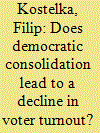|
|
|
Sort Order |
|
|
|
Items / Page
|
|
|
|
|
|
|
| Srl | Item |
| 1 |
ID:
156696


|
|
|
|
|
| Summary/Abstract |
This article challenges the conventional wisdom that democratic consolidation depresses voter turnout. Studying democratic legislative elections held worldwide between 1939 and 2015, it explains why voting rates in new democracies decrease when they do, how much they decrease, and how this phenomenon relates to the voter decline observed in established democracies. The article identifies three main sources of decline. The first and most important is the democratization context. When democratizations are opposition-driven or occur in electorally mobilized dictatorships, voter turnout is strongly boosted in the founding democratic elections. As time passes and the mobilizing democratization context loses salience, voting rates return to normal, which translates into turnout declines. The second source is the democratic consolidation context, which seems to depress voter turnout only in post-Communist democracies. Finally, new democracies mirror established democracies in that their voting rates have been declining since the 1970s, irrespective of the two previous mechanisms.
|
|
|
|
|
|
|
|
|
|
|
|
|
|
|
|
| 2 |
ID:
179842


|
|
|
|
|
| Summary/Abstract |
This article explores the intellectual puzzle of whether the domestic political instability associated with the Arab Spring is responsible for a surge in global terrorism that peaked in 2014. A series of negative binomial regressions demonstrate strong support for an “escalation effect”: more severe forms of domestic political instability, most notably government purges and riots, breed greater levels of terrorism, although the most severe form of domestic political instability—revolution—does not. We also find that specific types of domestic political instability affect terrorism levels differently depending on geographical region and regime type (i.e., democracy versus dictatorship).
|
|
|
|
|
|
|
|
|
|
|
|
|
|
|
|
| 3 |
ID:
184236


|
|
|
|
|
| Summary/Abstract |
We investigate persistence and determinants of deaths from conflicts in a sample of 163 countries for the period 2010–2015. The empirical evidence is based on the Generalized Method of Moments. First, the findings are contingent on income levels, religious domination, landlockedness, regional proximity, and legal origins. We find that the persistence of deaths in internal conflict is more apparent in coastal, French civil law, and Islam-oriented countries, compared to landlocked, English common law, Christian-oriented countries, respectively. Second, the following factors are generally responsible for driving deaths from internal conflicts: homicides, conflict intensity, and conflicts fought. Furthermore, incarcerations have negative effects on internal conflicts. Justifications for the established tendencies and policy implications are discussed.
|
|
|
|
|
|
|
|
|
|
|
|
|
|
|
|
|
|
|
|
|